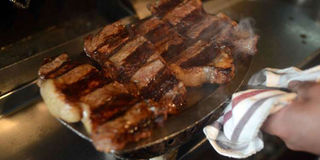Sausages, bacon cause cancer, says UN agency

A cook holds a tray with roasted beef at a traditional grill market in Buenos Aires on October 27, 2015. Eating sausages, ham and other processed meats causes colon cancer, and red meat “probably” does too, a UN agency has said. PHOTO | AFP
What you need to know:
- These include meat that has been salted, cured, fermented or smoked — hot dogs, sausages, corned beef, dried meat like beef jerky or South African biltong, canned meat or meat-based sauces.
- The numbers were dwarfed by the estimated one million cancer deaths a year due to tobacco smoking, 600,000 from alcohol use, and more than 200,000 due to air pollution, said the agency.
- Given that red meat is an important source of human nutrition, the results should help governments and regulatory agencies balance the risks and benefits of eating meat, it said.
PARIS
Eating sausages, ham and other processed meats causes colon cancer, and red meat “probably” does too, a UN agency has said.
This is a potentially heavy blow for the global meat industry.
The analysis of 800 studies from around the world by the International Agency for Research on Cancer found “sufficient evidence in humans that the consumption of processed meat causes colorectal cancer.”
These include meat that has been salted, cured, fermented or smoked — hot dogs, sausages, corned beef, dried meat like beef jerky or South African biltong, canned meat or meat-based sauces.
The finding supports “recommendations to limit intake of meat” — particularly in processed forms, said the research agency on Monday.
“In view of the large number of people who consume processed meat, the global impact on cancer incidence is of public health importance,” Mr Kurt Straif said in a statement.
For an individual, the risk of getting cancer from eating processed meat was statistically “small”, the agency said, but “increases with the amount of meat consumed.”
“Each 50-gramme portion of processed meat eaten daily increases the risk of colorectal cancer by 18 per cent,” the statement said.
REPORT CRITICISED
For unprocessed red meat — beef, veal, pork, lamb, mutton, horse or goat, the review found “strong” evidence of a cancer-causing effect, but not sufficient to place it in the same group of cancer-causing agents as tobacco smoke, asbestos, and now also processed meat.
As for processed meat, the red meat risk was mainly for cancer of the colon and rectum, but also the pancreas and prostate, said the report.
The agency cited research attributing about 34,000 cancer deaths a year worldwide to diets high in processed meat.
As for red meat — if the suspected link were to be confirmed — it would account for some 50,000 cancer deaths per year worldwide.
The numbers were dwarfed by the estimated one million cancer deaths a year due to tobacco smoking, 600,000 from alcohol use, and more than 200,000 due to air pollution, said the agency.
Meat producers, as expected criticised the report, as independent experts urged caution in interpreting the numbers.
The North American Meat Institute said the research agency “tortured the data to ensure a specific outcome”.
“Followers of the Mediterranean diet eat double the recommended amount of processed meats. People in countries where the Mediterranean diet is followed, like Spain, Italy and France, have some of the longest lifespans in the world and excellent health,” said meat institute vice-president of scientific affairs Betsy Booren.
British nutrition expert Elisabeth Lund said via the Science Media Centre: “Very few people in Europe eat sufficient meat to fall into the high meat consumption category.”
SOURCE OF IRON
She went on: “Meat is such a good source of iron and zinc and many women are short of these key micronutrients. Iron is much more available from meat than from vegetables or supplements.”
According to Britain-based nutrition researcher Ian Johnson, “there is little or no evidence that vegetarians in the UK have a lower risk of bowel cancer than meat-eaters”.
The report of the research agency, based in Lyon, France, was compiled by 22 experts from 10 countries.
Given that red meat is an important source of human nutrition, the results should help governments and regulatory agencies balance the risks and benefits of eating meat, it said.
The agency made no finding on whether the method of cooking meat affects cancer risk.
Meanwhile, at Rio de Janeiro’s famed Churrascaria Palace restaurant, the sizzling of steaks, the swish of carving knives and sighs of satisfied diners drowned out the UN warning that meat can cause cancer.
Finishing an all-you-can-eat lunch, Mr Gilson Gregoris, 59, said not even the United Nations could change his favourite menu.
“I eat meat almost every day,” the systems analyst said. “I know it’s not good. But it’s good!” Mr Gregoris added, smacking his lips.
COLORECTAL CANCER
They eat almost three times as much meat as average European Union residents, according to figures from 2014, while the huge country is also a leading producer of beef and other livestock.
So the warning from the International Agency for Research on Cancer — saying that processed meats like sausages sharply increase colorectal cancer risks and that red meat “probably” also poses a risk — is a hard sell.
Walk around Rio de Janeiro or any Brazilian town on a Friday night and you are never far from the whiff of a barbecue, either at a sidewalk cafe or at impromptu roasts held in squares and quiet residential streets.
“It’s a Brazilian tradition,” said Mr David Campos, a 43-year-old agronomist dining with Mr Gregoris.
Ms Viviane Escaleira, 44, added: “We grow up eating it.”





